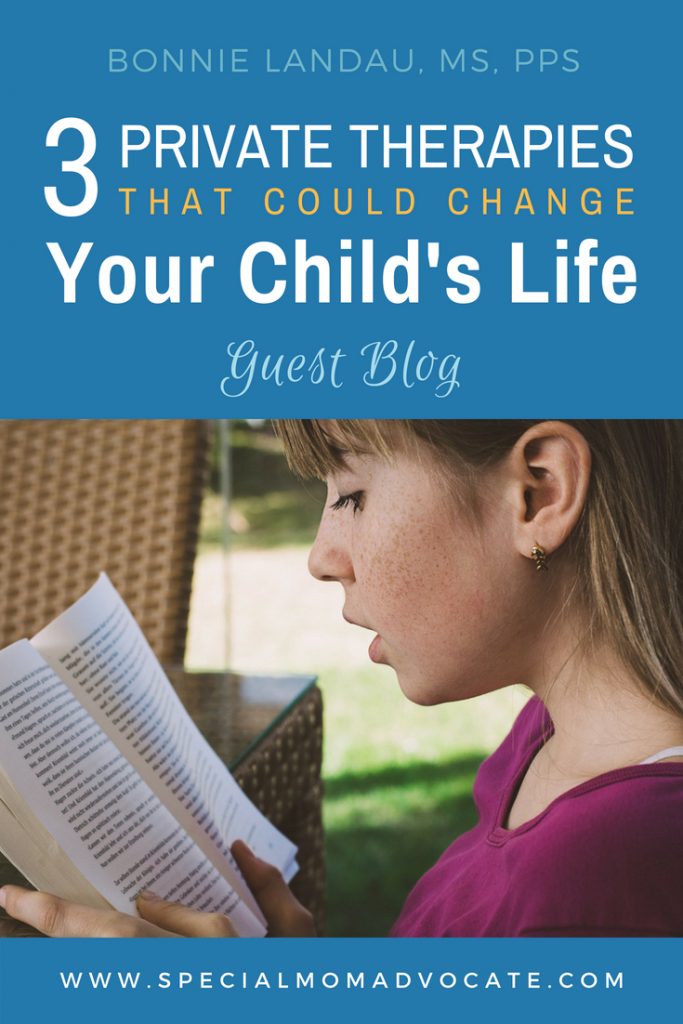You know that public schools just aren’t equipped to give every child exactly what she needs; and, while you’d desperately like to, you just can’t do it all at home on your own either. There are, however, some proven private therapies with the potential to change both your and your child’s life dramatically. Whether your child has an injury, traumatic brain injury or unknown cause of developmental delays, these 3 therapies can be crucial to long-term success.
Speech Therapy
While not just a single thing, speech therapy, in general, is a treatment for speech and language disorders – and sometimes for what lies behind those disorders. Speech disorders are characterized by difficulty producing specific words and sounds, and language disorders involve difficulty understanding words, as well as problems stringing sentences and ideas together for effective communication. The ultimate goal of speech therapy is to help your child gain the ability and master the skills to communicate through the medium of speech/language.
Speech therapists use both repetitive exercises and training methods and certain assistive devices. These devices, used for what is known as augmentative and assistive communication (AAC), produce sounds and speech as a pattern to emulate for those children who are nonverbal or only slightly verbal. In addition, speech therapy aims to go beyond addressing speech/language problems alone. Consider, for example, these disorders and conditions the therapy targets:
- Articulation disorders – These involve difficulty produce the correct sounds to form syllables of words and speaking words correctly and understandably.
- Fluency disorders – This group of disorders would include stuttering characterized by abnormal stoppages, repetition, and prolonged syllables.
- Receptive/expressive disorders – A family of disorders often involving difficulties understanding and processing language, it is most often characterized by an inability to form sentences and communicate in a coherent manner.
- Dysphagia – Although not exactly a speech issue, it is closely related. Dysphagia is a feeding disorder that manifests itself in difficulty eating and swallowing.
- Birth/surgery complications – This could be anything from birth defects like a cleft palate to birth injuries, a brain injury, for example (in which case you may also want to seek out the services of an attorney skilled brain injury law).
The causes of these several disorders that speech therapy aims to treat include:
- Cognitive/learning disabilities
- Hearing impairments
- Birth defects
- Autism
- Motor planning problems
- Brain injury
Depending, of course, on your child’s particular individual needs, speech therapy sessions most often involve modeling of correct speech and repetitive exercises to lay down mental pathways for that correct speech to become second nature. But it’s not all just hard work because therapists often use play, during which they model correct speech and articulation, to stimulate communication and as part of the repetition.
The key with speech therapy (as with many others) is early intervention. In many case when children begin speech therapy early, they progress and improve enough that they don’t need it later in life – having learned to understand and use words and communicate effectively.
Occupational Therapy
No, helping your child develop work skills, say, learning to weld, and then get a job is not the goal of occupational therapy. It is, rather, helping your child develop and strengthen fine motor skills like tying shoes, using utensils, and writing. As a result, occupational therapy is often a component of special ed programs, with a focus on skills needed for successful play and interaction and academic tasks and with defined developmental milestones.
Occupational therapists typically use play-based techniques, strategies, and routines designed to target areas of delayed development and difficulty. Another component of this therapy is called the sensory integration approach, which aims to help children better process and tolerate information they receive through their senses.
Occupational therapy is commonly offered to children in early intervention and special ed and will be part of your child’s IEP. Just make sure the occupational therapist is an integral part of the IEP team, fully involved and present at meetings. Still, private occupational therapy for your child is often a better option because the professionals in private practice are less harried and have more time for individualization of programs.
The good news for you as a parent is that with occupational therapy you are generally encouraged to be involved. You can often observe therapy sessions and ask question of the therapist. The therapist can also advise you on what areas you need to address at home and what supplemental work you can and should do. And because the exercises are usually play based, it can be a fun time for both you and your child.
Educational Therapy
Educational therapy, usually suggested if your child struggles in school, is designed to help children with learning and attention problems. It involves an educator working one-on-one with your child, but it is not the same as tutoring. An educational therapist could be a reading specialist who helps children with ADHD difficulties or a counselor who helps children master organizational and study skills. Educational therapy, then, isn’t as specialized as speech or occupational therapy.
The fact that it is a broader discipline is the source of many of the benefits of educational therapy. For example, if your child suffers from math anxiety or dyscalculia, a math tutor would likely just drill pertinent math problems over and over again. But an educational therapist would dig deeper and try to discover why your child struggles with number sense, often addressing the underlying attention and learning issues. The educational therapist would help your child with strategies for recognizing number facts and work on coping skills to deal with the anxiety.
Of course, schools do many similar things, especially for children with IEP or 504 plans. But what the schools offer just may not be sufficient, especially when your child needs help with specific skills. Educational therapists can fill the gaps because they usually specialize, for example, in multi-sensory reading instruction and in helping children with specific issues like ADHD.
Since educational therapists often have a better understanding of the underlying issues causing academic problems, they can use specific treatments and strategies to:
- Identify so-called behavioral issues that are actually the result of learning/attention issues
- Help improve focus and work habits
- Improve management/organizational skills
- Develop specific, highly individualized educational plans
- Serve as liaison between school and home
An educational therapist can also serve as a kind of case manager for your child, coordinating with teachers, specialists, and tutors and reviewing IEP and 504 services. Basically, your educational therapist can make sure everything your child needs is in place and that it all works together in the best complementary way.
Unfortunately, educational therapy is usually not available in public schools and can be accessed only in private practice and in some learning centers. It does happen, though, that some educational therapists work in schools, as well as having a private practice.
If you decide to pursue this valuable option and want to find a good educational therapist, be sure to check out the Association of Educational Therapists (AET). The AET has rigorous qualifying criteria for its certification program, including specific special ed training and continuing ed requirements.
Is your child getting the therapies she needs?
So, speech therapy, occupational therapy, educational therapy – these are the 3 private therapies that can change your and your child’s life. Whether your child’s issues stem from ADHD or autism, brain injury or birth defect, you can find help and improvement with one (or more) of these therapies.
It is crucial you have a good understanding of what is available for your child. Sometimes the school can provide support, and sometimes you have to pay privately. If your child has a personal injury, or health condition, and you are struggling to get insurance to cover therapies, contact our law offices and find out if we can help you get the therapies that are needed.
ABOUT THE AUTHOR:
Bonnie Landau is a professional counseling and holistic therapist in Ventura County, California. Her specialities include therapy for autism, therapy for ADHD, and therapy for parenting who have kids with autism or ADHD or other neurodivergence. She changed careers from graphic design to counseling with the goal of helping struggling parents of kids with ADHD, autism, or other neurodivergence find strategies and solutions to help their children succeed. Bonnie is also the author of Special Ed Mom Survival Guide: How to Prevail in the Special Education Process and Find Life-long Strategies for You and Your Child.




